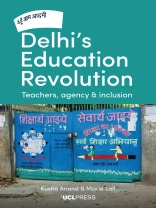In 2015, the Aam Aadmi Party (AAP) was elected to govern Delhi promising to improve public services, including education through government schools that would be the equal of private-school provision. Media reports, along with the party’s re-election in 2020, suggest strong public confidence that AAP are delivering on that promise. But is this success reflected by experience in schools?
Delhi’s Education Revolution offers a critical evaluation of the AAP’s education reforms by exploring policy and practice through the eyes of one key group: the government-school teachers tasked with making the AAP’s pledge a reality. Drawing on 110 research interviews conducted via Zoom during the Covid pandemic in the summer of 2020, teachers explain how the reforms have changed their profession and practice, and whether education really has improved for children of all backgrounds. Analysis of views about critical issues such as inclusion and the pressure of achievement targets in classrooms that often contain more than 50 students, informs their observations about the reform programme itself. The study paints a more qualified picture of success than suggested elsewhere and makes a valuable contribution to the understanding of education reforms in India, and most especially, in Delhi.
Tabella dei contenuti
Acknowledgements
List of figures
List of abbreviations
1 Setting the scene
2 Education policy and politics in India and in Delhi
3 Teachers, training and capacity building: what do teachers want?
4 Teachers and the Delhi classroom: what has changed?
5 Teachers and inclusion: success for all?
6 Teachers and COVID-19: challenges of a pandemic
Epilogue: Was it a revolution?
References
Index
Circa l’autore
Marie Lall is Professor of Education and South Asian Studies at the UCL Institute of Education, and former UCL Pro Vice Provost for South Asia. Her research focuses on the politics of South Asia including education in India, Pakistan and Myanmar with regard to gender, ethnicity, conflict, social exclusion, the formation of national identity, and the linkage between national identity, citizenship and education. She has over 25 years of field experience and has been instrumental in providing thought leadership to development agencies, policy makers and governments in the region and internationally.












